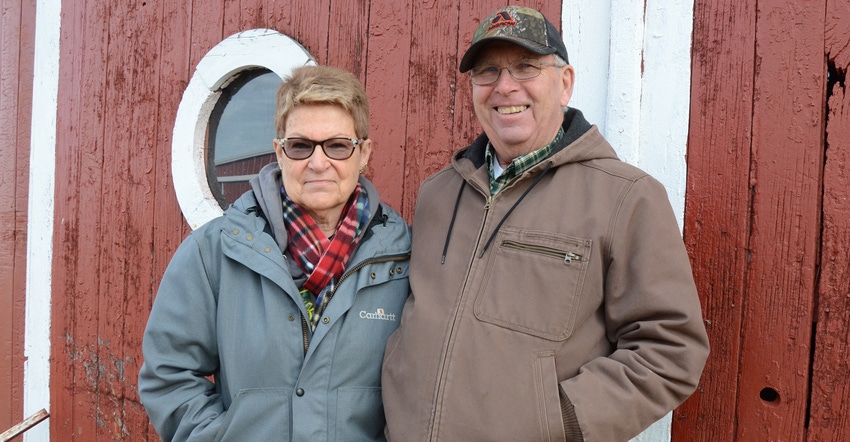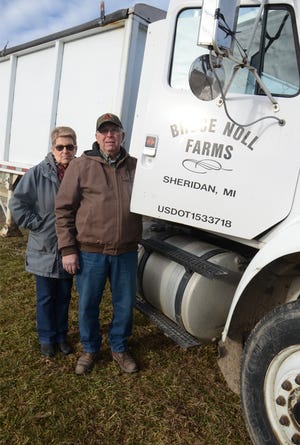
Bruce Noll knows that being a good farmer starts with the soil. He has spent a lifetime looking for ways to protect, diversify and build a foundation for not only his crops, but also for crops grown in the future.
“Bruce was the definition of a sustainable farmer before sustainability was a topic of conversation,” says Phil Tuggle of Michigan Agricultural Commodities.
For many years, Tuggle has worked with Noll on his crop inputs and marketing strategies.
“Throughout his many years farming, he has never strayed from focusing on the environment, the economics and his community,” Tuggle says.
Noll recently was recognized as a 2019 Master Farmer at the Great Lakes Crop Summit in Mt. Pleasant, Mich. The award is named for the year that it is given because it recognizes a lifetime of farming.
“The first thing that comes to mind when thinking about Bruce is ‘steward of land,’” Tuggle says. “Every farmer hopes to leave the land better than the day he received it. Bruce truly lives this. Through innovation and dedication, there is no doubt that the Noll Farm is more productive and healthier than when Bruce’s grandfather settled it in 1901.”
Today, the Montcalm County farm in Sheridan consists of about 760 acres of corn, soybeans and wheat and has been 100% no-till for more than 30 years. It is verified through the Michigan Agriculture Environmental Assurance Program (MAEAP) and has been the host to many field days.
“Four years ago, some Extension folks dug pits so people could see where the earthworms had made their burrows, some 3 to 4 feet down,” Bruce says. “The corn roots were following those burrows. There’s no doubt that the soil health has benefited from all those years of no-tilling.”
Cover crops also have been added to the operation following wheat. “I wanted something covering the ground all the time,” Bruce says. “It’s building biodiversity into the soil and better soil health.”
Two years ago, he planted oats and tillage radishes. Last year, he says, those soybean fields yielded 10 bushels better than fields without cover crops. “I realize that was one time, one year, but I think those cover crops are important,” he adds.
Bruce tests each field’s soil every three years and fertilizes according to those recommendations. In addition to no-till and cover crops, “Bruce works to maintain the soil by using nitrogen stabilizer,” Tuggle says. “He focuses on providing crops with the nutrients needed based on the conditions, rather than applying a standard rate over every field.”
Obtaining the MAEAP verification in 2015 was simple, he says.
“I had been doing most of the things MAEAP required already,” he says. “I had 30 years of records, with all my inputs and soil tests. I think being verified is important because it shows the neighborhood that you are trying to do the right thing.”

STEWARD OF LAND: Bruce Noll and his wife, Jill, stand by a truck on the farm in Sheridan, Mich.

Getting started
Bruce’s grandfather, Renauldo, settled the land using horses to get the soil ready. Bruce’s father, Charles, who was one of six children, took over the farm in the 1930s after Renauldo passed away suddenly from a heart attack. At that time, it was a dairy farm, growing corn, silage, oats and hay.
Bruce was born in the house he now lives in, and he and his three brothers were active on the farm, especially when it came time to put up hay.
Cleaning four months of cow manure from stalls didn’t exactly create a love for farming for Bruce. As an 8-year-old, he aspired to be a ball player — maybe baseball or football. But, as his farm responsibilities broadened, so did his love for working the land, being outside and milking cows.
“Despite that chore, I think all kids need to shovel stalls to learn the value of hard work and maybe get them off their phones for a bit,” he says with a smirk.
As college got closer, Charles started a rather unique tuition fund, Bruce says. “On rented ground, he put in edible beans as the start of our college money. It was work for us to do in the summer… hoeing by hand. And, if we got through them, we hoed them again.”
Bruce no longer raises edible beans because of the risk and time involved. “And, I haven’t figured out how to no-till them,” he says.
After college, he planned on starting a dairy with his brother, David. He went to Michigan State University to pursue a degree in dairy science, while David was called to Vietnam. Bruce graduated from MSU in 1964, but David never came home.
Bruce spent the next two years as a milk tester in Eaton County and then two years working for State Farm Insurance as a claims adjuster before returning to the farm in 1968 — the same year the cows were sold.
He bought the farm in 1972 and that year married Jill Warren. He had met her while playing golf at small golf course in Sheridan where she worked.
Jill was a schoolteacher for nearly 30 years. “She went to work every day and supported us,” Bruce says. “During the tough times, her wages kept us going. We endured the tough times, and there were good ones, as well.”
Their daughter, Angela, is a Mecosta County Conservation officer, and their son, Charlie, who is married to Teri, is the sheriff in Ionia County. As the kids were growing up, livestock returned to the farm, albeit for 4-H projects. At one time, they had about 20 Simmental cows, laying hens, feeder pigs and horses.
Bruce and Jill also have five grandchildren, from 3 to 20 years old.
Conservation minded
Bruce’s community leadership has included serving as a township trustee and supervisor, a member of the Montcalm County Planning Commission, and executive board member of the Montcalm County Economic Alliance.
But his service also goes beyond the community. He believes in being a voice for wildlife — their conservation and habitat. For the past 14 years, he has served as chairman of the Montcalm County Conservation District. He’s also a member of Ducks Unlimited, Pheasants Forever, Quality Deer Management and Mid-Michigan United Sportsmen Alliance.
The family has a long history of hunting, fishing and general love of the outdoors.
The long-term plan for the farm is unclear.
“I don’t foresee either of our children taking over the farm,” Bruce says. “I’m 76 years old; not sure when I will retire. It’s a decision every year. I bought seed for this year. When I do retire, I’m sure I will rent the farm. I’ve had several rental inquiries.”
Master Farmer profile
Name: Bruce Noll
Farm: Noll Farms, 760 acres owned and rented; cash crops, corn, soybeans and wheat. No-till since 1988.
Nominated by: Phil Tuggle, Michigan Agricultural Commodities
Leadership: Past supervisor of Crystal Township, Montcalm County Planning Commission, Montcalm Economic Alliance Executive Board, past vice president Montcalm Land Use Committee; member of Mid-Michigan Sportsman Alliance, Ducks Unlimited, Pheasants Forever, Quality Deer Management
Ag. Leadership: Member Montcalm Farm Bureau and past president, life member of Montcalm Fair Board, Montcalm County Conservation District board of directors and chairman since 2002
Awards: Montcalm Conservation District co-operator of the year, 1998; Goodyear/N.A.C.D. award of merit, 1998; Michigan Association of Conservation Districts Director of The Year, 2013
About the Author(s)
You May Also Like






